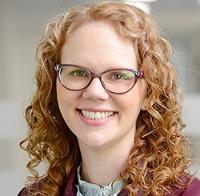Amber Cushing is Lecturer (Assistant Professor) for the School of Information & Communication Studies, University College Dublin
When it comes to digital curation in Ireland, a lot, actually. In 2014, I was recruited by University College Dublin (UCD) to start an Msc in Digital Curation. Digital curation has been concisely defined as “the management and preservation of digital material to ensure accessibility over the long term” (Abbott, 2008). In essence, preservation is only part of the process, digital curation prescribes that sustaining long term access to digital material should be considered before the object is even created, but selecting optimal file formats, a preservation strategy, etc. I thought my background, having been a PhD student at the UNC School of Information and Library Science, that launched one of the first degrees in digital curation had prepared me for this. I knew the major issues in the field, as well as the key literature. Just to be sure, I, along with UCD School of Information and Communications Head of School Professor Kalpana Shankar, decided to embark on a needs analysis of digital curation in Ireland.
Over the course of two years, we collected data from information professionals working in Ireland (the Republic and Northern Ireland) about their uses of and needs for digital curation via web questionnaire about use of curation and current needs, followed by in person interviews and then followed by another web survey about continuing professional development (continuing education) needs.
We were surprised to find that data analysis revealed that in Ireland, individuals would engage with digital curation and not even realise it, or report problems in which digital curation knowledge and practices could be of use, but report that digital curation would not be of use to them. Analysis suggested that people did not report digital curation of no use because it was actually of no use, they just did not know what the term actually meant. This was puzzling at first, as the term “digital curation” was widely used in many countries, including the US, UK, Canada, and Australia. How can the term digital curation be so foreign when there was a whole centre dedicated to Digital Curation, just across the Irish Sea?
This was a problem for us (as educators) because people were reluctant to enrol in a degree called digital curation when they didn’t now what the degree was actually about and how it would help them land a job. The in depth interviews revealed that the term also caused problem for the professionals who work to manage digital data on a day to day basis because their colleagues and managers did not know what they spent their time on or why they needed funding to complete their duties.
After considering our findings, I made a bold choice: I would reorganise the Msc degree, change the name of the programme and add a new module focused on outreach and “inreach.” Starting in 2018, the digital curation degree will be known as Msc in Digital Information Management, a title that I hope, will be more likely to resonate with an Irish audience. I have also developed a new module that will focus on outreach, the traditional activity of identifying needs of a constituency and then developing practices and projects that meet those needs, as well as something I’m currently calling, “inreach,” to educate professionals about how to educate their colleagues and managers about what the do, it’s significance, and how to advocate for necessary funding to complete their work duties.
In addition to the above required module that will be delivered online, the Msc programme will focus on tracks to meet individual education needs: a digital information management in businesses and private organisations track, a digital information management in cultural heritage institutions track and an digital information management in higher education and the public sector track. Each of these tracks will allow students to enrol in a core set of modules that will prepare them to work in the area of digital curation, while the elective modules will prepare students for the unique issues they will face doing digital curation work in different sectors. Starting in September 2018, students will be able to engage in digital curation education via a 90 credit Msc, a 60 credit graduate Diploma, a 35 credit graduate certificate and a 15 credit professional CPD certificate.
In the past twenty years or so, digital curation has grown and is debatably, now considered a discipline (Condon, 2014). While it is more common to find job titles of “digital curator” in the US or parts of the UK, the term has not enjoyed global uptake. When the goal is to ensure long term access to sometimes fragile digital material, proper activity, not vocabulary may need to take precedence.
The study mentioned above will be published in an upcoming issue of Archives and Records:
Cushing, A.L. & Shankar, K. (2018). (submitted). Digital curation on a small island: A study of the professional education and training needs in Ireland. Archives and Records.
